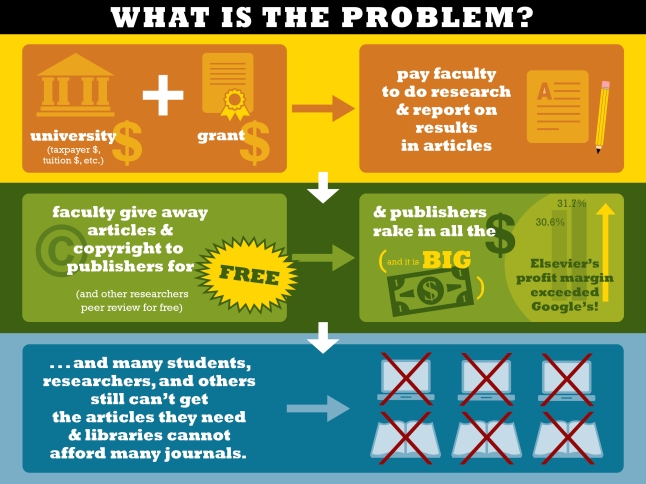Open Access
Imagine you are a content producer: an academic who wrote a research paper. You did your job, now you want to share it with the World. Below, I am going to argue for one thing: make it available on the Internet for free.
The free arXiv Physics archive (1991) begun a small revolution in the scientific world. Traditionally, a scientist would submit his paper to a peer-reviewed journal. Which, in turn, would (hopefully) publish it and obtain revenues from subscription fees paid by other Universities. Then, Open Access (OA) was born: the scientific work could be viewed for free online [1].
Advantage 1: This just makes sense.
It makes perfect sense: scientist got funding to do his job – and in most cases, that is public money. So why should the society pay fees to access the content created using banknotes taken from their own pockets?
Advantage 2: Wider audience sees, reads and cites your work.
Moreover, there are advantages for you personally: the research shows that by obeying Open Access policy, scientific articles gather more views and citations. Which makes perfect sense – certain group of people that normally would not buy the periodical containing specific article, now can read the work for free. Evidence:
Disadvantage 1: Open Access may cost you money.
It all looks great on paper. However, there are always some publication costs, hence someone has to pay the publishers. There are essentially two choices: either you (an Author) can cover the costs (‘golden’ approach), or you publish behind a paywall and on a free repository (‘green’ case). Here is an example of a publisher’s policy:
Advantage 3: OA makes Science work more effectively
Finally, the open approach helps the development of human knowledge. It enables easier communication between researchers, fostering further development and innovation. It is not only much faster to spread research results through the Web, but also makes your work easier to be found.
Disadvantage 2: Lack of quality control (?)
Finally, an issue usually brought up in discussions on Open Access is the ‘predatory open access’. This term describes unethical publishers, who lack acceptable peer-review. By paying publication fee, an article is going to be published regardless of its scientific value.
Why shouldn’t you care about the last point? Firstly: by choosing a respectable journal, your work is going to be reviewed properly. Secondly: unethical practices are present in ‘traditional’ publishing as well. It probably is a problem with the peer-review system, not the Open Access.
Sources:
1. Edwin Bendyk, Justyna Hogmokl, Alek Tarkowski et al., Przewodnik po otwartej nauce [A guide to open science], Interdisciplinary Centre for Mathematical and Computational Modelling @ University of Warsaw, [Polish]
2. Piled Higher and Deeper (PHD Comics), Open Access Explained!, youtube.com [25.10.2012]
3. Euan Adie, Attention! A study of open access vs non-open access articles, altmetric.com/blog [23.10.2014]
4. Rita Pickler, Jane Noyes, Lin Perry, et al., Authors and readers beware the dark side of Open Access, Journal of Advanced Nursing [12.12.2014]
5. Ernesto Priego, Predatory journals and defective peer review are general academic problems, not just open access problems, LSE Impact Blog [7.10.2013]
Word count: 415


